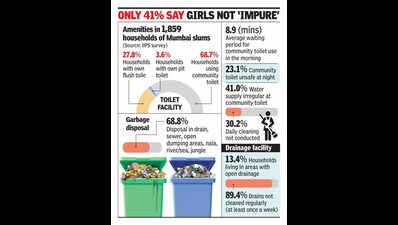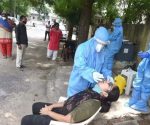Survey: 30% in slums spend 1.5k pa on menstrual issues due to lack of facilities – Times of India

Mumbai: Around 30% Mumbai’s slum residents spend Rs 1,500 annually on menstrual-related issues due to lack of accessible, round-the-clock civic health facilities, a survey by International Institute of Population Sciences (IIPS) has found. The data, compiled from June-Sept, is based on responses from 1,275 girls and women aged 12-24 and 584 boys and men aged 15-24.
Only 9.7% sought care and treatment from a govt facility for menstrual problems, 35% relied on home remedies, and 30% spent on private care.
Dr Daksha Shah, BMC’s executive officer health, was unavailable for comment.
The IIPS data suggested that more girls (95.5%) who started their period in 2024 had access to menstrual hygiene products, compared to 70.8% of respondents aged 20-24 a decade ago. However, stigma persists, with only 41.3% of respondents believing that girls are not “impure” during menstruation.
The results of the survey are riddled with such contrasts. While the data shows progress—72.8% of respondents across age groups accepted that women can cook and enter the kitchen while menstruating—the report’s authors stressed the need for a more nuanced understanding of these findings. Dr Aparajita Chattopadhyay, professor at IIPS and contributor to the survey, explained that respondents in the qualitative phase often posed a rhetorical question: “Who else will cook the food in the house?”
The survey also found that 89.1% of women had access to their usual sleeping place during menstruation, while only 19.5% believed it was acceptable to visit a place of worship or attend an auspicious event at such a time.
Dr Rama Shyam, in charge of adolescent health at SNEHA, an NGO, called the findings “a mixed bag of positive and concerning factors”, cautioning against their misinterpretation. She said in slums, limited living space forces women to sleep in their usual spots, which may obscure discriminatory attitudes seen elsewhere. “Discriminatory attitudes exist across classes and persist even in affluent societies.”
Dr Chattopadhyay noted that while awareness among men has grown, menstruation is still seen as primarily a women’s issue. Only 6.7% of men were aware that pregnancy is most likely to occur midway through a woman’s menstrual cycle. Many young men (67%) are informed about period through schools, while 60% report learning about them from male friends. “This is concerning because information from friends does not always translate into accurate knowledge,” said Dr Shyam. “In schools, menstrual education is often not taught effectively, and teachers themselves are ill equipped to handle the topic.”
The survey found 35% of males still believe menstruating women are “impure”. “Young boys are kept away from conversations about period at home and young adults struggle to initiate such conversations even with their wives,” Dr Chattopadhyay said.
Nishant Bangera, founder of the Muse Foundation, which raises awareness about menstrual health in Mumbai’s slums, schools and colleges, said, “While education is helping break taboos among women, it hasn’t yet helped men understand the subject. In conversations with students, discussions about period with boys often turn into sex education.”
















